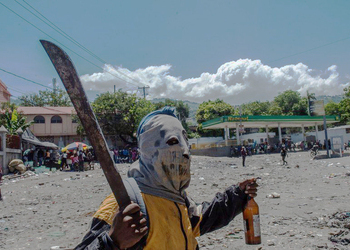Anti-gang vigilantism is spreading and gaining public support amid escalating insecurity in Haiti, raising the possibility that such movements could coalesce into criminal organizations.
What began as a spate of extrajudicial murders of alleged gang members in recent weeks has grown into a full-blown vigilante movement dubbed “Bwa Kale,” Haitian Creole for “peeled wood.”
Most recently, several alleged gang members belonging to the well-known Kraze Baryè gang were reportedly killed on May 7 and 8 in the Petionville neighborhood of the capital, Port-au-Prince, according to Haitian newspaper L’Exclusivité.
Similar incidents have killed dozens in other neighborhoods since late April, according to local media reports, though no official estimates had been released as of early May.
SEE ALSO: The Rise of Haiti’s Violent Rural Gangs
The spark for Bwa Kale occurred on April 24, near the Canapé Vert neighborhood in the south of Port-au-Prince, when Haiti National Police (PNH) officers apprehended 14 gang members. A crowd pressured the police to hand the suspects over to a mob that stoned them and burned them with tires, according to videos shared widely on social media.
Bwa Kale has primarily consisted of large groups of civilians armed with improvised weapons, hunting down and killing alleged gang members and burning their bodies. At least one police officer appears to have been mistakenly targeted.
The vigilante phenomenon is not exclusive to Port-au-Prince. In the western city of Miragoane, a senior security official, Jean-Ernest Muscadin, has gained popularity for leading extrajudicial killings and commanding militias without police authorization. He has faced widespread condemnation from Haitian human rights organizations.
While Acting Prime Minister Ariel Henry condemned the Bwa Kale lynchings, Frantz Elbe, Haiti’s chief of police, initially advocated for closer collaboration between the police and the population. However, he later denounced the vigilante killings as well.
The PNH remains severely understaffed and ill-equipped to combat violence. In April, the United Nations (UN) reported Haiti’s police had only 9,000 active-duty officers in a country of more than 11 million people, meaning just one officer for every 1,200 people. For comparison, the New York Police Department has about 36,000 officers for just 8.5 million people.
While the police have not necessarily encouraged extrajudicial killings, they also haven’t strongly opposed them, Henri-Louis Mars, the executive director of Lakou Lapè, a Port-au-Prince-based peacebuilding organization, told InSight Crime.
“They’re accepting any help they can get from the population,” he said.
InSight Crime Analysis
The lack of capacity and resources in Haiti’s judicial and security systems has fueled vigilantism and provides a context that is ripe for vigilante groups to expand into other illegal activities.
Vigilante groups have sprung up in response to ineffective local security institutions in other countries throughout Latin America and the Caribbean. Though these groups start out fighting criminal organizations, they frequently take advantage of popular support and a lack of institutional capacity to move into criminal economies like extortion, arms and drug trafficking, and murder-for-hire.
In Mexico, several notorious criminal groups began as localized “self-defense movements,” known as auto-defensas, where civilians took up arms against other gangs. However, over time, many became increasingly linked to the criminal underworld, eventually mimicking the structures they once hoped to eradicate. Dangerous gangs, especially the Viagras and the Tepalcatepec Cartel in the western state of Michoacán, began in this way.
In El Salvador, vigilante groups masquerading as community police have long carried out extrajudicial killings of gang members, especially during government anti-gang campaigns. However, investigations by Salvadoran media showed how these groups had become infiltrated by serving police and military personnel and had seen instances of torture, arms trafficking, and extortion.
And in Colombia, the paramilitary United Self-Defense Forces of Colombia (Autodefensas Unidas de Colombia – AUC) began as a death squad targeting guerrilla groups in the 1980s, but were soon victimizing and extorting activists, union leaders, and civilian populations.
The factors that gave rise to Bwa Kale, such as the absence of functional judicial and security institutions, could allow its followers to mimic this trend of other countries in the region.
“It’s a reaction from a population which has not been protected by the police, not been protected by the government, so they’ve taken things into their own hands,” said Mars.

